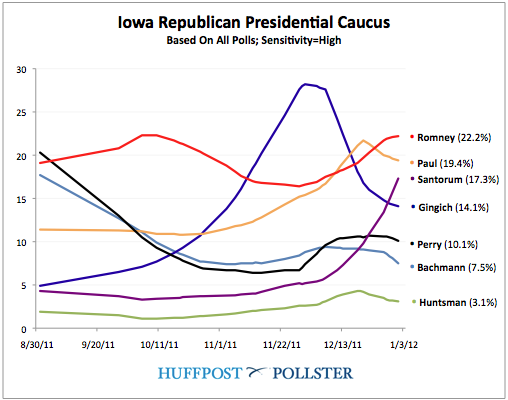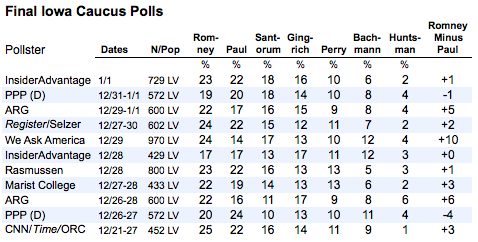
WASHINGTON -- With Iowa's Republican presidential caucuses just hours away, the final polling snapshot shows a close race, but the surveys are also reasonably consistent about where things currently stand: former Mass. Governor Mitt Romney leads Representative Ron Paul by a slim margin, followed by former Representative Rick Santorum, whose support has increased rapidly over the last week.
The limitation of a polling snapshot is that, as a snapshot, it is subject both to late shifts in support and errors in predicting precisely, in this case, which of Iowa's 2.3 million eligible voters will turn out for an event that typically draws just over a hundred thousand.
Two new surveys released on Monday altered the final polling picture only slightly. HuffPost Pollster's chart, based on all public polls in Iowa, currently shows Romney leading with 22.2 percent, Paul in second but fading slightly over the last two weeks to 19.4 percent, Santorum rising fast to 17.1 percent, and former House Speaker Newt Gingrich still falling and now at 12.9 percent. Texas Governor Rick Perry (10.1 percent), Representative Michele Bachmann (7.5 percent) and former Utah Governor Jon Huntsman (3.1 percent) all show very slight declines over the last week.

Or consider the 11 individual recent polls fielded within a week of the caucuses: Eight of 11 show Romney leading by at least a single percentage point. Ten of 11 show Santorum running third or lower. While the differences may not be large enough to attain statistical significance in any one poll, the consistency across polls indicates that Romney's lead is real.

To confirm that Romney is really ahead, we could run a sophisticated statistical model -- or just calculate the odds of flipping a coin and having it come up heads 8 times out of 11. If Romney and Paul were really tied, the odds that at least 8 of 11 polls would show Romney in the lead is just 11 percent.
Of course that math assumes two things that may not turn out to be true: First, that the polls are collectively free of statistical bias, and that any shortcomings in the way they identify the likely electorate are not skewing the snapshot in some meaningful way. Second, it assumes that any surges in support for a particular candidate are over and have not changed the standings over the final days of the campaign. The history of polls conducted before Iowa's caucuses says both assumptions are questionable.
However, if political polling is always some combination of science and art, the process of interpreting the current snapshot and trying to guess at its potential flaws and any future trends is mostly art. That process can be informed by empirical evidence, but it still relies on a heavy dose of subjective judgment.
With that qualification in mind, consider the evidence for whether the current polling snapshot might change or be in error:
First, the case for a Ron Paul win, given the current snapshot and trends, is not strong. Paul's support has been in decline for the last two weeks, and his negatives have been rising. On the Des Moines Register Iowa Poll, for example, the percentage who say they like Paul least among the candidates increased from 13 in late November to 21 percent last week. Again, it's a matter of judgment, but the evidence that polls are sampling too many, rather than too few, of Paul's typically younger supporters is strong.
Second, what evidence suggests that Santorum's surge could translate into a stunning upset win?
- Santorum has clearly seen a recent surge of support, gaining nearly four percentage points on the trend line over the last five days.
- Santorum's support has been strongest among self-identified evangelical Christians, and polling averages from prior Iowa caucuses have often significantly understated support for candidates with similar bases of support, such as Pat Robertson in 1988, Pat Buchanan in 1996 and (to a lesser degree) Mike Huckabee in 2008.
- Conditions seem ripe for the sort of tactical voting that could accelerate Santorum's recent rise, as Tea Party Republicans have already demonstrated a willingness to support a series of candidates to avoid supporting Romney. Santorum's surge in the polls might spark a last-minute collapse of support for candidates like Bachmann and Perry in favor of Santorum.
So, although there are strong arguments for a potential Santorum upset, the arguments for a Romney victory may be stronger.
- Romney's support has also been rising, not as quickly as Santorum's, but still more than five percentage points since bottoming out in late November.
- Santorum's impressive momentum may not be enough. The epicenter of the current polling average was roughly this past weekend and, as such, Santorum's current pace, gaining 0.78 percentage points per day, will not be sufficient to close Romney's roughly five-point lead without significant acceleration.
- While plausible argument exists that polls have been under-sampling evangelical voters this year compared to past caucuses, an equally compelling case can be made that Iowa polls are understating potential participation by older Republicans, who heavily favor Romney.
- Romney has been steadily gaining support from Republican "party actors" in November and December, among both senior Republican officeholders nationwide and local activists and officials in Iowa and other early primary states. Political scientists have found thatendorsements by prominent party members are often a better leading indicator of the ultimate nominee than polls.
- Finally, both Iowa activists and likely caucus-goers think Romney is going to win the caucuses. Economist David Rothschild has found evidence that such expectations often predict the outcome of elections more accurately than traditional trial-heat questions, particularly in low-turnout primary elections where likely voters are hard to sample.
Yes, the recent surge of support for Rick Santorum is real and could conceivably produce a surprise result Tuesday night. It is also possible that Ron Paul could pull off an upset, particularly if polls have been under-sampling his supporters. But for now, the best evidence available says that Romney is ahead in Iowa and is likely to stay ahead once all the votes are counted.
